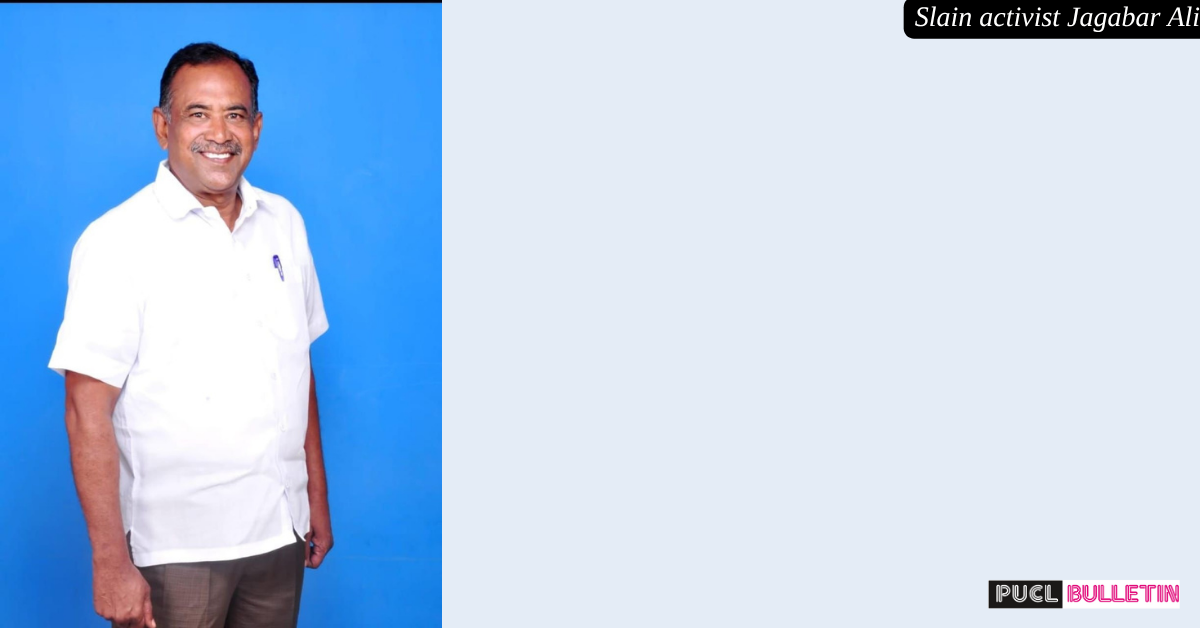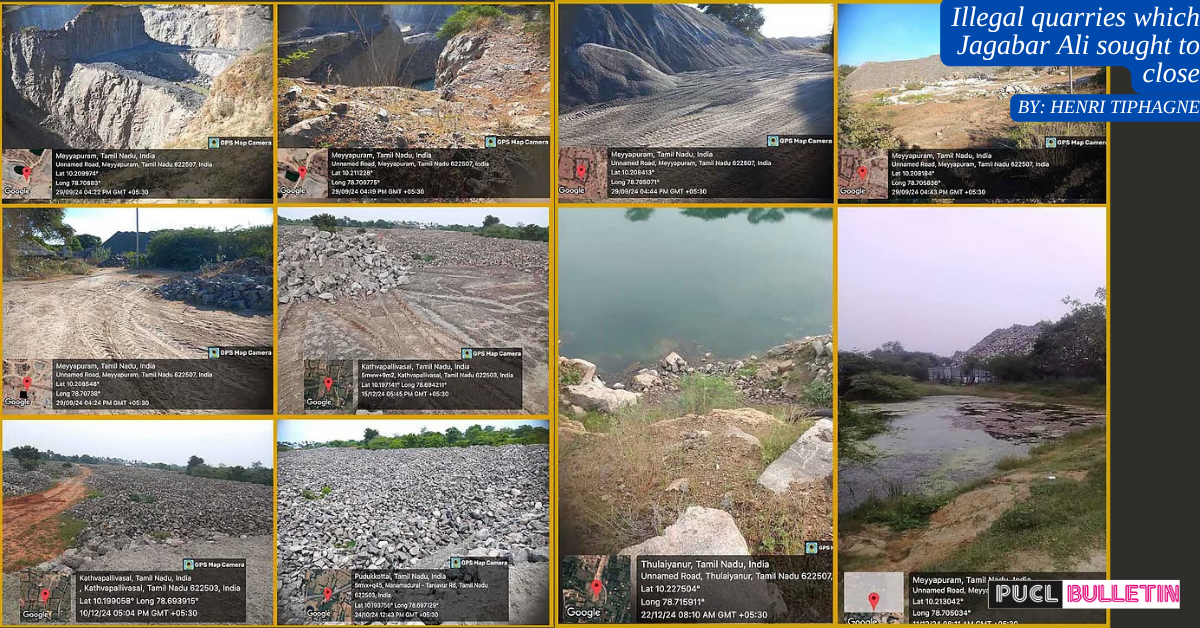Killings of environmental human rights defenders: The dire cost of fighting illegal mining in Tamil Nadu

By Henri Tiphagne, Ashish Reddy
Like everyone has a right to a clean environment; it is part and parcel of the right to life, which is a fundamental right enshrined in the Indian Constitution; every Indian citizen also has a fundamental duty to safeguard the environment. Anyone, either an individual or a group, who works to protect and promote the human right to a clean, healthy and sustainable environment, including water, air, land, flora and fauna, is identified as an Environmental Human Rights Defender (EHRD). EHRDs are often stigmatized, criminalized, threatened and killed for their work to protect our environment, and they face increased risks based on intersecting patterns of discrimination, exclusion, and marginalization. Two such instances from Tamil Nadu, which highlight the fatal risks faced by EHRDs, are discussed in this article.
Illegal mining has become rampant in Tamil Nadu, particularly in Karur, Madurai, and Pudukottai districts, where blue metal minerals are abundant. Over the past two decades, mineral exploration and the granting of mine and quarry licenses have increased significantly, leading to widespread environmental degradation. In 2020, the Environmental Impact Assessment (EIA) was made mandatory for all mining activities in Tamil Nadu. However, this regulation has inadvertently contributed to illegal mining, as many operators continue extraction beyond their lease periods due to weak enforcement and lack of oversight on mine closures. The unchecked mining operations have severely impacted agriculture, polluting water sources and affecting the health of villagers. The fine dust emitted from stone crushers contributes to air pollution, causing respiratory illnesses among local communities and disrupting livestock farming. The use of advanced machinery for mineral extraction has accelerated the depletion of natural water sources, drying up wells and affecting irrigation.
Jaganathan, Karur district
Jaganathan (50) a farmer from Pugalur Taluk, Karur district, had been advocating for the closure of illegal quarries in Kalipalayam village, Kuppam panchayat. The quarries and crushers were run illegally after expiry of the lease period in 2015. The stone crusher was located adjacent to the land of Jaganathan, which affected his crops and livestock. This prompted Jaganathan to advocate for the closure of illegal quarries before various government officials. To stop his activism, the owners and operators of quarries attempted to murder Jaganathan in 2019 by attacking him with brutal weapons. Jaganathan survived the attack, registered a complaint and ever since sought police protection, fearing further attacks from the quarry owners. Despite several threats, he continued to advocate for the closing of illegal mines by submitting petitions to various government authorities. This resulted in the closure of the quarry and crusher on September 8, 2022. On September 10, 2022, the owners and operators of the quarry conspired and murdered Jaganathan by ramming him with a truck operated by the quarry. Then they tried to stage it as an accident. It was only upon the intervention of activist Shanumugham on the ground, along with other Human Rights organisations, before the Inspector General of Police, Central Zone, that the FIR was altered from accident to murder, and the investigation officer was changed. The accused were arrested and placed in judicial custody, they are currently awaiting trial.
The case of Jaganathan has been taken up by the United Nations Special Rapporteurs (UN SR) on Human Rights Defenders, the UN SR on Sustainable Environment and the UN SR on extrajudicial, summary or arbitrary executions. The UN SRs highlighted India’s obligation under ICCPR and the Declaration on Human Rights Defenders.
Jagabar Ali, Pudukottai district

Jagabar Ali, a small business owner of Thirumayam, Pudukkottai district, Tamil Nadu, had been advocating for the closure of an illegally operated stone quarry in Pudukottai district. In January 2023, he had submitted a representation seeking closure of illegal quarries operating in Thirumayam, Pudukkottai district, to the collector, Assistant Director of Mineral Resources Department, Superintendent of police and Director of Tamil Nadu Geology and Mining Department. Since then, he had been receiving threats from quarry owners, which he reported to the police and sought police protection. He intervened before the High Court (WP (MD) 8946/2023) and obtained an order from the Madurai bench of the Madras High Court on September 5, 2023 to investigate illegal stone quarries in Pudukkottai district.

He had assessed the loss of Rs 840 crores of mineral resources due to illegal mining on January 10, 2025 in an online interview. Shortly thereafter, the owners and operators of an illegal quarry conspired together to kill Jagabar Ali by ramming him with a tipper lorry while he was proceeding on his motorcycle on January 17, 2025, due to which he sustained grievous injuries and died on the spot. On January 18, 2025, 24 hours after the murder, Thirumayam police registered an FIR in Crime No. 9/2025 as unnatural death. Despite the oral and written complaints given by the wife of Jagabar Ali to Thirumayam police, his body was kept without a freezer and post-mortem was conducted by an assistant surgeon along with pharmacy staff without following any of the judicial guidelines or NHRC protocols. The family of Jagabar Ali had to approach the Madurai bench of the Madras High Court seeking a re-postmortem. Only then was the investigation transferred to the CB-CID.
Evading laws and preventing justice
It is the duty of the state to protect the right to life. The state is required to take special measures of protection towards persons in vulnerable situations whose lives have been placed at particular risk because of specific threats or pre-existing patterns of violence, as provided in the General Comment of the Human Rights Committee on the International Covenant for Civil and Political Rights (ICCPR). The States are also required to take the necessary measures to respond to death threats and to provide adequate protection to human rights defenders, including the creation and maintenance of a safe and enabling environment for defending human rights. Investigations and prosecutions of potentially unlawful deprivations of life should be undertaken in accordance with relevant international standards, including the Minnesota Protocol on the Investigation of Potentially Unlawful Death, and must be aimed at ensuring that those responsible are brought to justice, at promoting accountability and preventing impunity. Under article 12 of the United Nations Declaration on Human Rights Defenders, states have an obligation to take all necessary measures to ensure the protection of everyone against any violence, threats, retaliation. As per Framework Principles on Human Rights and the Environment, states must provide a safe and enabling environment in which individuals, groups and organs of society that work on human rights or environmental issues can operate free from threats, harassment, intimidation and violence.
In both cases, the activism of EHRDs resulted in the closure of illegal mining activities. In Karur, closure of the quarry led to the murder of Jaganathan, and in Pudukottai, the death of Jagabar Ali forced the district administration to enforce the order of the High Court dated September 5, 2023, which is to close illegal quarries in Pudukottai District. In both cases, the EHRDs faced threats which were reported to the police, and protection had been sought. But the police failed to provide protection and ignored the pleas of the EHRDs. In both cases, the police sided with the quarry operators and registered the case as an accident. It was only due to the intervention of activist Shanumugham and a human rights organisation that the Jaganathan case was transferred to other officers, and the Jagabar Ali case was transferred to CB-CID. Even though the accused have been arrested and the quarries have been closed, the families of the EHRDs are facing significant threats. They have applied for witness protection under the Witness Protection Scheme 2018, but the police are yet to facilitate the same.
Inspite of the serious threats that EHRDs face, the National Human Rights Commission (NHRC) of India has so far not classified the subcategories of HRDs. The Courts as well as National Human Rights Institutions in India have not implemented the principles of Business and Human Rights to hold businesses accountable for the killings of EHRDs.
Henri Tiphagne is a human rights advocate based in Madurai, Executive Director of People’s Watch and National Working Secretary of Human Rights Defenders Alert – India. Ashish Reddy is an advocate and researcher at Human Rights Defenders Alert – India.